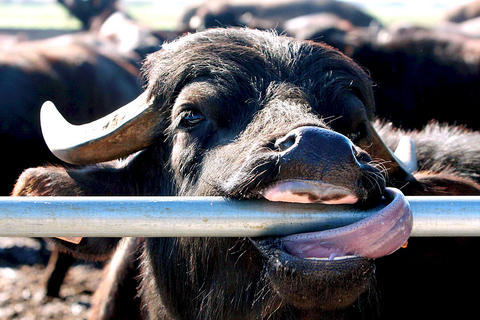Italy ordered checks on hundreds of mozzarella factories as part of safety measures following the detection of dioxin-tainted products, authorities said on Saturday.
The latest measures were decided together with EU health authorities, and were announced shortly after China imposed a ban on imports of mozzarella and Singapore told markets to suspend sales.
The Health Ministry in Rome said the first checks will involve about 400 cheese factories that use buffalo milk in the areas of Naples, Caserta and Avellino -- three cities in the Campania region, a main producer where the contamination has been detected.

PHOTO: EPA
Sales of milk or any other products from these facilities will be suspended pending results of the testing, the ministry said in a statement. The results will be given to EU health officials by the middle of next month.
An additional 200 cheese factories in other cities in the region will be checked at a later stage, the ministry said. These results are expected by April 25.
Italy said last week that it had detected moderately higher levels of dioxin than allowed under EU rules in 25 mozzarella-makers, and that it was conducting further tests.
Dioxin is a chemical that is linked to cancer, birth defects and organ failure and can be dangerous even in small amounts.
Italy has assured consumers that all products in supermarkets are safe, and EU health officials backed off threats to impose a Europe-wide ban on mozzarella from Campania.
But China and Singapore became the latest countries to announce restrictions on their imports of the soft white cheese. Farmers group Coldiretti estimated it would take at least a month to restore sales levels for buffalo mozzarella.
It said it was necessary to restore consumer confidence after the scare, which has been affecting domestic and international markets.

NEXT GENERATION: The four plants in the Central Taiwan Science Park, designated Fab 25, would consist of four 1.4-nanometer wafer manufacturing plants, TSMC said Taiwan Semiconductor Manufacturing Co (TSMC, 台積電) plans to begin construction of four new plants later this year, with the aim to officially launch production of 2-nanometer semiconductor wafers by late 2028, Central Taiwan Science Park Bureau director-general Hsu Maw-shin (許茂新) said. Hsu made the announcement at an event on Friday evening celebrating the Central Taiwan Science Park’s 22nd anniversary. The second phase of the park’s expansion would commence with the initial construction of water detention ponds and other structures aimed at soil and water conservation, Hsu said. TSMC has officially leased the land, with the Central Taiwan Science Park having handed over the

AUKUS: The Australian Ambassador to the US said his country is working with the Pentagon and he is confident that submarine issues will be resolved Australian Ambassador to the US Kevin Rudd on Friday said that if Taiwan were to fall to China’s occupation, it would unleash China’s military capacities and capabilities more broadly. He also said his country is working with the Pentagon on the US Department of Defense’s review of the AUKUS submarine project and is confident that all issues raised will be resolved. Rudd, who served as Australian prime minister from 2007 to 2010 and for three months in 2013, made the remarks at the Aspen Security Forum in Colorado and stressed the longstanding US-Australia alliance and his close relationship with the US Undersecretary

TAIWAN IS TAIWAN: US Representative Tom Tiffany said the amendment was not controversial, as ‘Taiwan is not — nor has it ever been — part of Communist China’ The US House of Representatives on Friday passed an amendment banning the US Department of Defense from creating, buying or displaying any map that shows Taiwan as part of the People’s Republic of China (PRC). The “Honest Maps” amendment was approved in a voice vote on Friday as part of the Department of Defense Appropriations Act for the 2026 fiscal year. The amendment prohibits using any funds from the act to create, buy or display maps that show Taiwan, Kinmen, Matsu, Penghu, Wuciou (烏坵), Green Island (綠島) or Orchid Island (Lanyu, 蘭嶼) as part of the PRC. The act includes US$831.5 billion in

‘WORLD WAR III’: Republican Representative Marjorie Taylor Greene said the aid would inflame tensions, but her amendment was rejected 421 votes against six The US House of Representatives on Friday passed the Department of Defense Appropriations Act for fiscal 2026, which includes US$500 million for Taiwan. The bill, which totals US$831.5 billion in discretionary spending, passed in a 221-209 vote. According to the bill, the funds for Taiwan would be administered by the US Defense Security Cooperation Agency and would remain available through Sept. 30, 2027, for the Taiwan Security Cooperation Initiative. The legislation authorizes the US Secretary of Defense, with the agreement of the US Secretary of State, to use the funds to assist Taiwan in procuring defense articles and services, and military training. Republican Representative